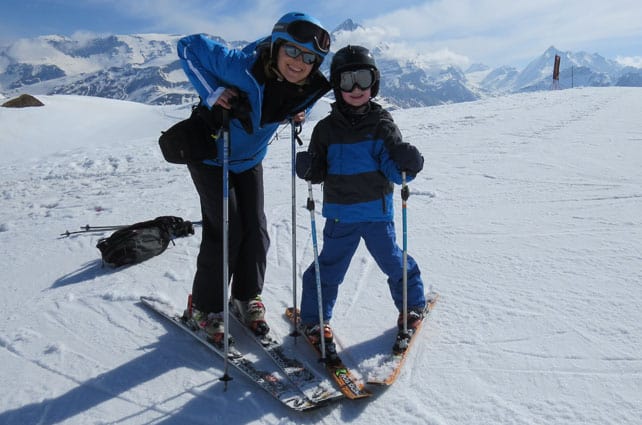
A family ski holiday can be a beautiful thing. It’s a chance to escape everyday routines, share some adventures with your kids, and show them there’s more to the world than Xboxes, Snapchat and shopping malls. And that’s before you’ve even considered the activity that anchors the whole experience: whizzing down the mountain on a pair of skis.
But there’s one question troubling many ski families these days – and it concerns the most basic of issues.
When should we go?
Picking the right week for a family ski holiday has become a headache. A recent run of poor starts to winter has made both Christmas and New Year look like a risky time to ski. The last two Easters have been warm as well, turning many pistes into slush-pits. And all the while, the price of a February half-term package has been climbing ever higher.
But there’s no need to panic. Dig a little deeper into the issue and you’ll find that the season is full of opportunities for those who are well-informed about snow conditions, the state of the market, and the critical difference altitude makes at the beginning and end of the season. With a little research, you can slalom round the obstacles, and give your kids a break from everyday life that’ll have them buzzing until summer.
Here’s how the season ahead is shaping up – and where the opportunities lie.
Christmas and New Year
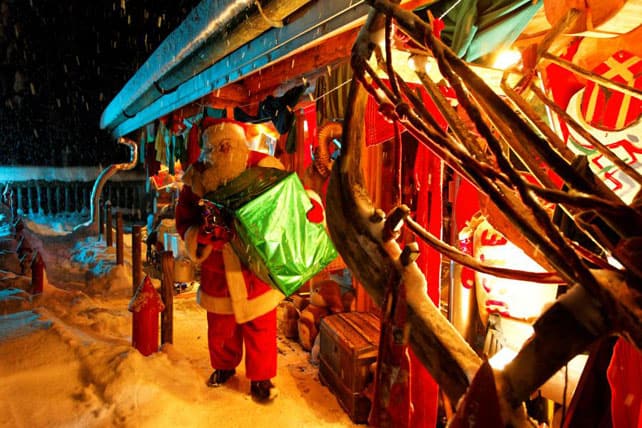
Worried about the snow over Christmas and New Year? No wonder. In parts of the Alps, many resorts were remarkably snowless over Christmas in 2014, 2015, and 2016.
It’s impossible to say whether or not Christmas 2017 will be the same. As I write, the Alps are enjoying an early spell of unseasonably cool and snowy early-autumn weather: but it’s due to end shortly, and could easily be followed by an Indian Summer. With this in mind there are only two sensible options:
1. Aim high: one of the constants of the early season is that the high-altitude resorts almost always offer decent skiing, even if the mountains are threadbare lower down. With plenty of pistes above the 2,500m mark, they hold onto most of the snow that falls after late November, and their cold, dry, high-altitude air is good for the snow cannons too. More and more are equipping themselves with state-of-the-art snow-making systems, as a result: Ischgl and Val d’Isere are two of the frontrunners in this respect, but these days none is leaving the white stuff to Mother Nature. Take your pick of Val d’Isere, Tignes, Val Thorens, Cervinia, Zermatt, Obergurgl or Ischgl, and you should at the very least have decent piste skiing, even if the off-piste routes are rock gardens.
2. Book at the last minute: anyone with a steady nerve and a lack of Christmas commitments back home can also wait to see if winter gets underway a little earlier this year, and grab a late-booking discount at the last minute.
It’s not out of the question. Several winters between 2007 and 2012 got off to strong starts (remember, for example, the mid-December dumps of 2012?). If the snow does come in late November and early December, then all those discounted holidays currently on offer to low-lying resorts will suddenly make sense. After all, low-lying resorts are often much closer to our idea of what a Christmas should look like than a high-altitude, purpose-built ski station: and some, especially Les Gets, make a real fuss over Father Christmas, too.
Here’s how the festive period breaks down.
Pre-Christmas Week
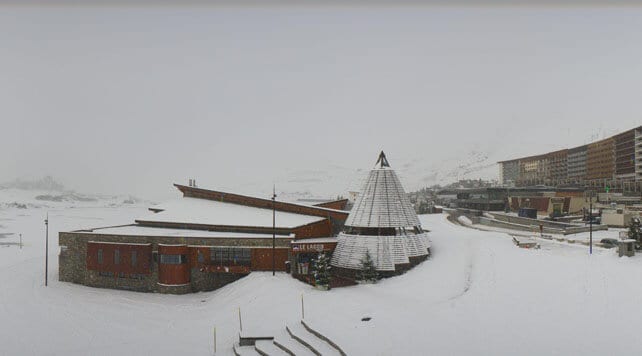
This winter, the pre-Christmas week runs from December 16/17 to December 23/4. Not every tour operator is offering it, but it’s a canny choice for parents with kids in private school (who break up a week earlier than those in the state sector), because it’s priced at low-season levels.
For example, Mark Warner’s excellent chalet-hotel in Tignes, the Aiguille Percée, is on offer from December 17 for £781pp chalet board, for a family of four, including flights and transfers. That’s 35% cheaper than Christmas week, 43% cheaper than New Year, and 54% cheaper than February half term. Tignes has its own glacier. Whatever the weather, you’ll be able to ski.
Christmas Week
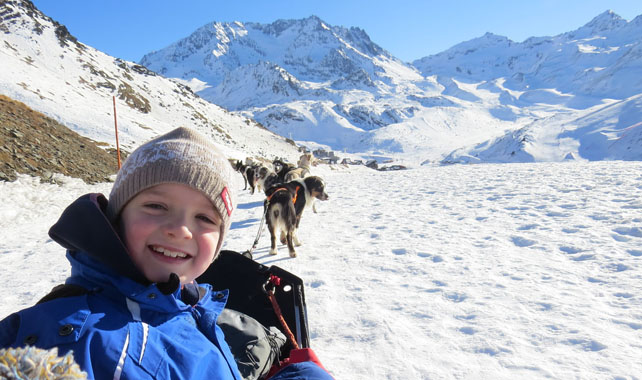
There are two things to note about Christmas ski holidays this year. First is that some tour operators, including Esprit, Total, Le Ski and YSE are running midweek departures over the festive period. So their Christmas holidays start on December 19 or 20 rather than December 23 or 24.
These holidays are noticeably cheaper than the ones on offer for New Year, even when the destination resort is high and snowsure. For example, family ski specialist Esprit has a week from December 19 in the Chalet Alpenblume in Obergurgl for £726pp, chalet board, and including flights and transfers, for a family of four with kids aged 5-10. That’s 42% cheaper than it is over New Year.
The second thing is that some tour operators are already discounting these low Christmas prices. At the time of writing Ski Total, sister company of Esprit, has cut 22% off the price of Christmas week at the Chalet Champs Avalins in snowsure Val d’Isere. This would suit a family that doesn’t need childcare, and can already ski. The price is only £529pp, chalet board, including flights and transfers. For a school-holiday week, that’s extraordinarily cheap.
In other words, if you’re looking for value for money for a family ski holiday this winter, Christmas week looks to be where you’ll find it.
New Year Week
Most families find it easier to get away over New Year than Christmas, and this winter they have a wide choice of departure dates: midweek (December 26 and 27) from some tour operators, and December 30 or 31 (at the weekend) from others.
Prices are noticeably higher than they are for Christmas, but all the same tour, some family-holiday specialists have reported a surge New Year bookings. So if you want to be sure of getting a chalet or chalet-hotel that offers English-speaking childcare in one of the high-altitude resorts, don’t wait until the last minute to book it.
February Half Term
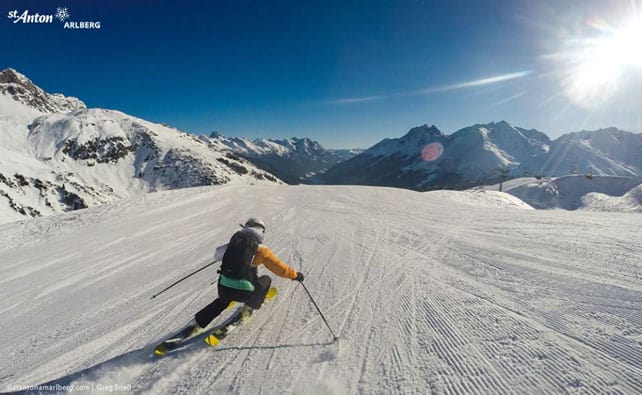
February half-term break has always been the plum week for family skiing. Yes, the slopes are busy – especially in the French Alps – and holiday prices are sky high. In many chases this winter, they’re more than double what they are for Christmas. But it’s also the moment when families often have the fewest commitments back home, and the snow is at its most reliable. In 2015, and 2016, after bumpy starts to the winter, conditions were exceptional in mid-Feb. They were pretty good in mid-February 2017 as well, although it was much warmer than it should have been.
For the second winter in a row, there are two half-term weeks in the UK.
1st half-term week (Feb 10/11 – 17/18)
London, the south-west, southern and eastern England, and parts of Wales, Scotland and the North, along with most private schools are off for this week: and more than ever, demand for family holidays with English-speaking childcare seems to be focused on it. By mid-September, family specialist Esprit had all but run out seats on its flights to France for half term. Ski Famille reported that most of their chalets were already full, too. If this is the kind of holiday you’re after, you need to book it as soon as possible – even if the price per adult is up around the £1,400-£1,600pp mark for catered accommodation, including flights and transfers.
Hoping for something cheaper? If you don’t mind doing your own cooking, and in-house childcare isn’t a requirement, then consider a self-catering apartment. It’s the type of accommodation most other European nations use when they ski: and it has the benefit of privacy and flexibility too. There’s no reason why it can’t work for Brits, too.
2nd half-term week (Feb 17/18 – 24-25)
Now it’s the turn of the North, the Midlands, and parts of Wales and Scotland. They’re the lucky ones. Demand for ski holidays is lower, and so are prices.
For example, a week from February 17 for a family of four in Crystal’s Chalet Traviata in Canazei is 48% cheaper this week than it is w/c February 10.
Bargain hunters are also more likely to get last-minute discounts for the second half-term week than the first; especially if they’re not too fussy about which resort they go to, and they don’t need a tour operator which offers specialist childcare.
Easter
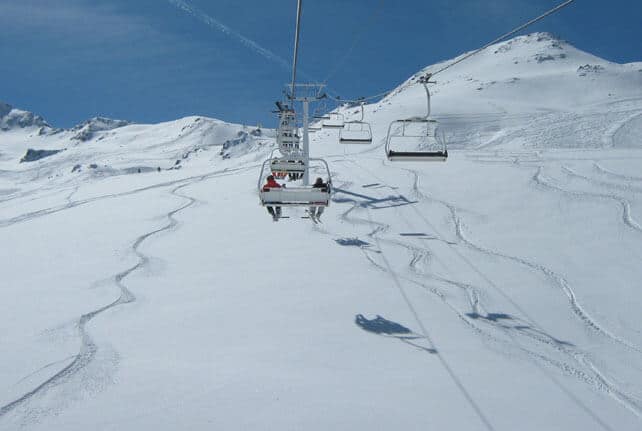
Easter can be a great time to go skiing – sunny, super-relaxed, and full of great skiing (if you adopt spring-skiing tactics). But you do need to be careful which resort you choose. Altitude is an essential requirement at this time of year, and the list of resorts to target is remarkably similar to the ones you’ll need for a snowsure early-season trip.
Lots of people know this, and the focus on a handful of reliable resorts means prices in the likes of Tignes, Obergurgl, Val Thorens, Les Menuires and Val d’Isere are far from cheap. They’re not quite as close to February half-term levels as they were last winter. But for the peak Easter week, starting March 31 or April 1, you can expect to pay around 80% of February half-term prices. Both the week beforehand (popular with private-school families) and the week afterwards are cheaper. Demand for the second week in April will be lower too. There’s the chance you might pick up a late-booking discount for it: but if you are bargain-hunting be sure you don’t compromise on the altitude of your resort.
Term-time holidays
Of course, there’s always the option of a term-time trip: although the Supreme Court’s judgement against crusading parent Jon Platt has created an even less sympathetic environment for parents than previously existed. Given mid-January ski holidays are often half the price of those over February half-term, you can understand the temptation. But at least this winter there’s a strikingly cheaper alternative in the school holidays as well: Christmas in a high-altitude resort.











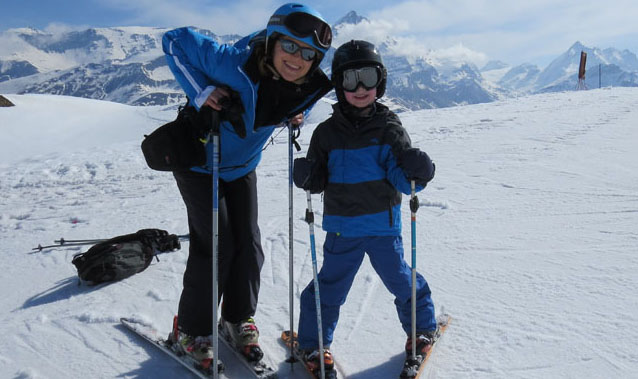





This is such a handy post! My eldest just started reception and I discovered with shock half term February prices for my favourite French resorts – almost 3 times more January prices we paid earlier this year! And we had such a blast in Tignes with Esprit that I’m very torn to go for anything else….